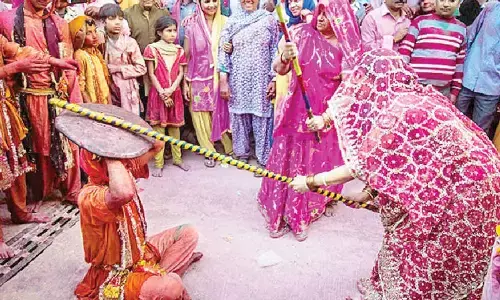Going beyond 'Say Sorry!'

Representational Image
- Sorry and please are often described as 'magic' words simply because of the inherent power they possess to transform situations -- be it placating the recipient, strengthening a bond, or managing relationships.
Sorry and please are often described as 'magic' words simply because of the inherent power they possess to transform situations -- be it placating the recipient, strengthening a bond, or managing relationships. Effective communication emphatically talks about its frequent but genuine use to establish rapport apart from being polite and respectful. In that, 'sorry' holds a special significance for children as they navigate through their growing up years.
The early years are dominated by the child's need to put himself/herself at the centre of every situation, often not realising that in doing so (this is a developmental milestone and will ease into maturity eventually), they could 'hurt' someone. And their need to resist apologising for their actions could largely be attributed to the fact that they are unable to fathom its severity and impact. For children, they are simply reacting and not intending to 'hurt' someone in a quest to protect themselves. They consider this an act of normalcy -- like snatching a toy that belongs to them, or pushing another child to get ahead, or jumping the line or speaking out of turn. Remember, their world is about them and hence it is important to educate children about feelings, appropriate behaviour, and how to build relationships.
As children 'age', the primary years become grounds for more experiences, and children naturally evolve into being more aware of the consequences of their acts. And through regular communication by watching adults around them, they tend to use the word more often to 'mend' the situation. As social creatures, and quick to please, they recognise the need to 'adapt' and 'mould' themselves as per norms that are likely to receive praise or acknowledgement.
In middle and high school years, the level of understanding about social interactions is purely the result of exposure and conditioning over the years, and therefore children ease into managing these relationships much better.
The key always remains the foundation, and the start, and consistent communication over the years with timely intervention to help students become the polite, sensitive, aware, and amicable adults we all aspire them to be. This requires efforts on part of those nurturing these students in school and at home as the 'seniors' who lead the way.
Fatema Agarkar, Educationist and Founder of ACE Some quick tips:
Role-model behavior
Children are silent observers of everything they see around them, and the best way for them to 'learn' how to manage relationships and use the word sorry, is if they see enough examples of adults apologising. For example, in a fit of anger, if an adult has spoken rudely to the house help or a teacher to a fellow teacher, by apologising in public and explaining the rationale to the little ones, children understand the concept of a mistake, and that mistakes can be rectified through acts or actions in a way that builds a stronger bond. Hence, the importance of public display is critical for children to know that they can adopt a similar approach when faced with a similar situation.
Cinema
Watching films that convey this message (lots of children films are about this) together with your children, and discussions after about what they understood and how the relationships became stronger because of the apologies is also a great way to communicate in a non-threatening way to the children. Often well-meaning adults tend to 'lecture' and children tune off given the plethora of instructions they receive daily, and these audio-visuals serve as an effective reminder of protocols to be adopted. Discussions post the film are important communication channels because it helps point out 'facts' that are important for them to know.
Books
Cannot emphasise how crucial this component is at any age -- great tools for expressing and role-modelling appropriate behaviour for children, and post a book reading, getting them to relate to situations that they have encountered is also a way to help them self-analyse.
Social media
There are lots of positive quotes, stories, and images on social media about relationships. Encourage children by sharing this with them especially how someone dealt with a particular situation and overcame it. It is motivational, positive, and gets them to think about 'solving' problems and for that matter, 'accepting' that everyone has them!
Rewards
Rewards do not have to be materialistic, but do use this liberally as words. Acknowledge, and praise when the children are using appropriate behaviour and mending ties! This is perhaps the most underutilised of all communication strategies -- as adults, the praise is reserved for performance academically or in co-curricular, and it is time, this gets incorporated for behaviour and skills that build relationships. Write your child an email, a letter, or create a card and let them know how proud you are of them.
Beyond 'sorry', the crux of communication and mentoring students remains focused on building relationships. For that, the children need to accept that mistakes happen, and these mistakes can lead to feelings of anger, aggression, or trauma for those at the receiving end. But that these are the moments that can be salvaged, and lead to better experiences and closer bonds. Sometimes demonstrating this to them, standing by their side as they attempt to, or pointing it out to them when they have not noticed will go a long way in creating happier children!










